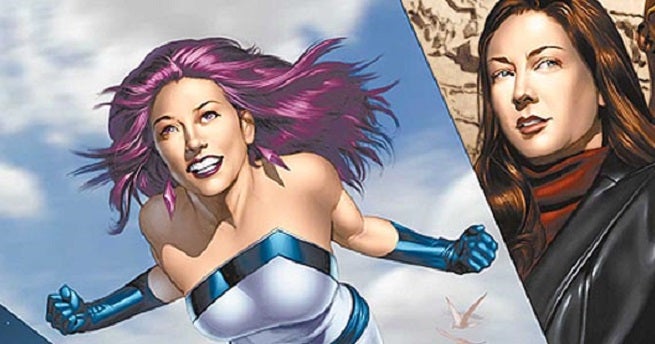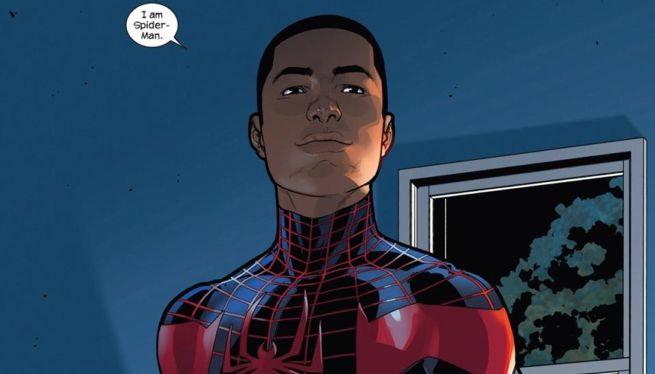Brian Michael Bendis is indisputably one of the biggest names in comics today. In the past 15 years he has redefined the Avengers and X-Men franchises, created more than a dozen highly popular characters, won five Eisner Awards, and written more Marvel events than you can throw cash at.
Videos by ComicBook.com
His currently writes more than five comics each month, with some featuring characters he co-created like Jessica Jones and Miles Morales. His influence and impact on comics, specifically Marvel Comics, is undeniable.
That profile has created a perception among some comics readers that Bendis essentially runs Marvel with some sort of special sway over any decisions being made. While he is respected and listened to among his peers, he is neither an editor nor an owner of the publisher. His role has remained that of a comics writer, and this is where his impact can be most clearly seen and felt. Unfortunately, perception is treated like reality and Bendis’ perception has led to him being seen as a figurehead for many of Marvel’s actions, especially its follies.
When Marvel makes a misstep or controversial decision, it is often Bendis’ name that is at the front of the conversation on Twitter and other message boards. In the past year he has been raked over the coals by comicsfans for issues ranging from the state of the direct market, creative assignments on specific books, and character choices. While the last of these three items does involve his input, the former two are ultimately far outside of his control.
It’s not that Bendis is somehow above being criticized. Critics ought to feel free to respond to what Bendis says on social media or places into a story. However, there is a distinction between criticizing a creator for their output and for actions they have no hand in. Criticizing Bendis’ work and his person are two different actions, and it seems they have begun to overlap in many uncomfortable ways.
It is worthwhile to consider the real impact Bendis has made at Marvel Comics; it must be significant given both the longevity and profile of his career. But what actual actions can be assigned to the man? What is he really responsible for? In spite of some perceptions, the reality reveals a lot of positives both on the page and behind the scenes.

Bendis’ most substantial contributions to the Marvel shared universe isn’t any selection of stories, but the characters he has added to it. Alias, one of his very first series for the publisher, added Jessica Jones (co-created by Michael Gaydos) and fused her with decades of continuity. Alias is notable in that it featured a solo female protagonist at time when the publisher had very few to offer. Furthermore it presented her as a fully formed character, defined outside of a tight costume and idealized forms. Her relationship with Luke Cage and sexual autonomy were also unique in 2001 (and a rarity still today).
Jessica Jones has only grown in popularity since her introduction and became the first Marvel Studios heroine to receive her own series or film. However, Bendis’ most substantial creation is probably that of Miles Morales a.k.a. Spider-Man (co-created by Sara Pichelli). Morales first appeared as a replacement for the recently deceased Spider-Man of Marvel’s Ultimate line. First introduced as a replacement for Marvel’s “Ultimate” Spider-Man, Morales broke down a variety of barriers and garnered a great deal of mainstream attention for being of African American and Puerto Rican heritage. Although the characterriled up critics on conservative networks like Fox News, Morales quickly gained a dedicated fanbase among Marvel readers who embraced the character. Following the events of Secret Wars, Morales has left the Ultimate line and joined the mainstream Marvel universe in the title Spider-Man, further boosting his profile.

More recently Marvel Comics announced Riri Williams, another new character created by Bendis and Stefano Caselli who would be assuming the role of Iron Man in the Marvel universe. Riri’s introduction is notable again for adding a diverse new character to a spot traditionally filled by a white man in Marvel Comics. This announcement also upset some who pointed to Marvel’s complete historical lack of black women in writing roles. It is a valid concern and one the publisher is making initial steps to confront with the hiring of Roxane Gay and Yona Harvey to write the upcoming series World of Wakanda. Bendis’ direct contribution to the entire situation is focused on the creation of Riri though, a positive stride in diversifying superhero comics on the page.
While Bendis does not have the power to hire writers or assign characters at Marvel Comics, he does possess influence over his own books and the ability to suggest creators for consideration. His career is a testament to long-term collaborations and loyalty towards artists. After the conclusion of Alias, he has waited until co-creator Gaydos’ schedule was open before considering writing another Jessica Jones ongoing series himself. His work on Ultimate Spider-Man saw a record breaking number of issues by the same creative team as he and artist Mark Bagley crossed the 100 issue landmark together. Currently, Bendis and Pichelli continue to work on Mile Morales together in Spider-Man, five years after introducing the character together.
Whether you speak to creators who have passed through Marvel or currently work there, Bendis’ name is bound to appear before too long. Writer David F. Walker (Shaft, Power Man and Iron Fist) attributes his jump from journalism to comics to his friendship with Bendis. After years of watching his friend follow his dreams, Walker created a plan to pursue his own passions and talked it over with Bendis. Walker says that as he began to pursue his dreams, “He just became one of my greatest cheerleaders… When I’ve been down and out, and he’s propped me up. When I score a victory, he’s one of the first to congratulate me.”
Bendis is also known for keeping his eye on small press and independent comics creators. He was the first person at Marvel Comics to take note of COPRA creator Michel Fiffe selling his renowned revenge comics on Etsy. After Bendis reached out to him, Fiffe was hired to write All-New Ultimates and create a short story for the anthology one-shot Secret Love. Fiffe says, “…it all stems from his love and interest in the world of comics. That enthusiasm has definitely helped a lot of us get a leg up.”
Speaking to creators like Walker, Fiffe, and Ed Brubaker, there is an undeniable tone of warmth and gratitude towards the man. He is well-liked and the increased profile of these and other peers has done the comics industry itself a great deal of good. None of this is to suggest Bendis for canonization or to say that he is beyond criticism. However, it does go to show the changes and improvements that Bendis has generated from his prominent position within the comics industry.
Considering both what Bendis has created at Marvel Comics and only some of the careers he has helped, it is impossible to deny that he has been a force for good in comics. Whatever critics may say about his work, an expansive bibliography impossible to summarize in any case, his impact goes far beyond the stories he tells. Bendis has been a generator of ideas and characters at Marvel, all of whom have helped rebuild a brand. And he has been a supporter of new talent, boosting voices from outside of the mainstream to further reshape comics’ consistently biggest publisher. When you put speculation aside and assess what has actually been done, Brian Michael Bendis’ career is one dedicated to making comics better.








